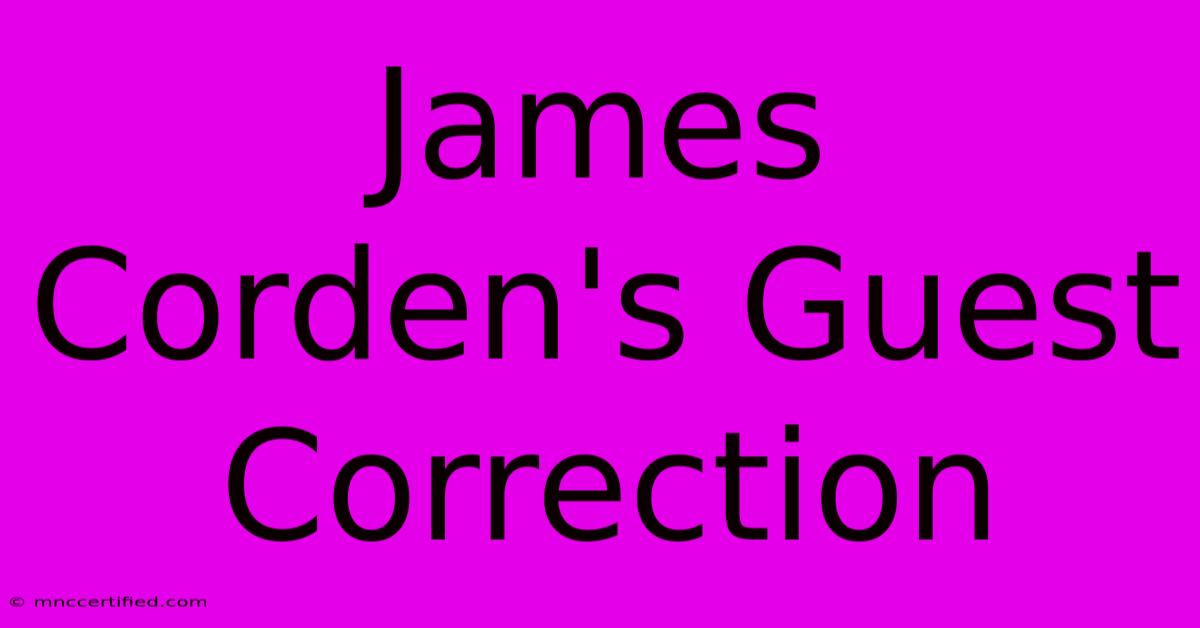James Corden's Guest Correction

Table of Contents
James Corden's Guest Correction: A Deep Dive into Late Night's Viral Moments
James Corden's time as host of The Late Late Show was punctuated by numerous viral moments, but few sparked as much conversation as his infamous "guest corrections." These weren't simple fact-checks; they were comedic, often awkward, and sometimes downright cringe-worthy interventions into his guests' narratives. This article explores the phenomenon of James Corden's guest corrections, analyzing their impact, their comedic style, and their lasting legacy in late-night television.
Understanding the "Guest Correction" Format
Corden's guest corrections weren't planned segments. They emerged organically, usually stemming from a guest recounting a story or anecdote. Corden, often with a mischievous glint in his eye, would then interject, subtly (or not so subtly) correcting a minor detail, a perceived exaggeration, or even a completely fabricated element of the story. The humor derived from the unexpected interruption, the subtle shift in power dynamics, and Corden's playful – yet sometimes insistent – manner of delivering the correction.
The Spectrum of Corrections: From Gentle Nudge to Full-Blown Debacle
The corrections ranged from lighthearted pokes at minor inaccuracies to more forceful, almost combative confrontations. Sometimes, a gentle "Actually..." would suffice. Other times, Corden would launch into a detailed, evidence-based refutation, complete with photographic evidence or eyewitness testimony (often fabricated for comedic effect). This unpredictable nature contributed to the segments' virality, keeping audiences on the edge of their seats, unsure of how the interaction would unfold.
Analyzing the Comedic Style and Impact
Corden's approach was a unique blend of playful antagonism and faux-authority. He often played the role of the know-it-all, armed with seemingly irrefutable "facts," even when those facts were entirely concocted. This created a dynamic tension between the guest, often caught off guard, and Corden, the self-proclaimed arbiter of truth. The humor often stemmed from the awkwardness of the situation, the guest's bewildered reactions, and Corden's unwavering commitment to his (often false) narrative.
The Role of Surprise and Audience Reaction
A key ingredient to the success of these segments was the element of surprise. The corrections weren't telegraphed; they erupted unexpectedly, catching both the guest and the audience off guard. This unexpectedness heightened the comedic effect, and the audience's reaction—a mixture of laughter, shock, and bewilderment—further fueled the virality of the clips.
The Legacy and Criticism: A Mixed Bag
While undeniably entertaining for many, Corden's guest corrections also drew criticism. Some viewers found them aggressive, condescending, or even disrespectful to his guests. The line between playful banter and outright rudeness could sometimes be blurred, leaving some wondering if the comedic value outweighed the potential for discomfort. This ambiguity contributed to the heated debates surrounding the segments, further solidifying their place in late-night television lore.
Beyond the Jokes: The Impact on Guest Relationships
It's important to consider the impact of these corrections on the guest-host relationship. While many guests played along, some clearly exhibited discomfort, raising questions about the ethical implications of prioritizing comedic effect over the guest's comfort and dignity. This aspect, often overlooked in discussions of the comedic value, adds a layer of complexity to the legacy of Corden's unique brand of late-night humor.
Conclusion: A Defining Element of Corden's Era
James Corden's guest corrections remain a defining element of his time hosting The Late Late Show. Their legacy is complex, embodying both comedic brilliance and ethical ambiguity. They highlight the delicate balance between playful antagonism and potentially offensive behavior in late-night television, serving as a case study in the challenges and rewards of pushing comedic boundaries. While the segments may be a part of television history, the discussions surrounding them continue to inform the way late-night hosts approach guest interactions and comedic delivery.

Thank you for visiting our website wich cover about James Corden's Guest Correction. We hope the information provided has been useful to you. Feel free to contact us if you have any questions or need further assistance. See you next time and dont miss to bookmark.
Featured Posts
-
Nottingham Forest Secures Top Four Spot
Dec 22, 2024
-
Mahomes Status Chiefs Texans Game
Dec 22, 2024
-
Lively Baldoni Dispute After It Ends Film
Dec 22, 2024
-
Premier League Palace Vs Arsenal Live Result
Dec 22, 2024
-
Jaens 9 4 Win Ends Barca Run
Dec 22, 2024